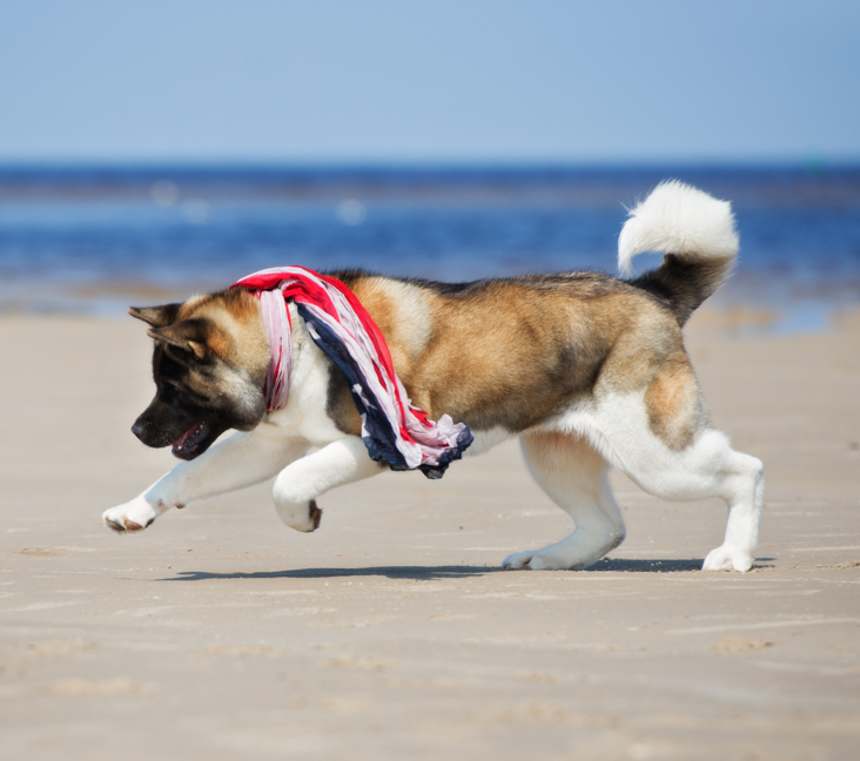Do Akitas have health problems?

Akitas are generally healthy but may be prone to health problems, including:
- Hip and/or Elbow Dysplasia: Hip and elbow dysplasia are two of the most common skeletal diseases seen in dogs. They are similar diseases in which either the hip or elbow joint has grown abnormally or is misshapen. The abnormal shape prevents the joints and sockets from adequately meeting one another, resulting in rubbing and grinding instead of sliding smoothly. Though the main complication with hip dysplasia is joint instability, the abnormalities present in elbow dysplasia often result in pieces of bone and/or cartilage breaking loose and irritating the joint tissues. Over time, the rubbing from dysplasia can cause a variety of issues, such as pain, lameness, and secondary osteoarthritis. Surgery can be done to fix the joint if diagnosed before the onset of arthritis. If you are rescuing an Akita, have them checked out by a vet to see if they have or are prone to getting dysplasia, so you know what they will be able to handle regarding activities and exercise.
- Patellar luxation: Also known as slipped kneecaps, patellar luxation is a common problem in many dog breeds. It occurs when slight abnormalities cause the knee joint to slide in and out of place. This can cause pain and occasional lameness. Surgical treatment is available for severe cases, although many dogs lead normal lives without treatment.
- Cranial cruciate disease: The cranial cruciate ligament is an important stabilizer in the knee joint. Cranial cruciate ruptures cause joint instability and are the most common cause of hind leg lameness in dogs. Surgery is recommended to prevent the tear from progressing to more severe joint disease.
- Eye problems: Glaucoma, a disease that causes excessive pressure on the eye, damages the optic nerve and eventually leads to vision loss and blindness; entropion, a genetic defect where one or both eyelids are inverted or roll inward and rub on the surface of the eye; cataracts, a common eye condition that causes cloudiness in the eye and obstructs vision; and progressive retinal atrophy (PRA), a progressive degenerative disease affecting the retina that eventually leads to blindness, are concerns in this breed.
- Autoimmune Disorders: Akitas experience many autoimmune disorders such as autoimmune hemolytic anemia, when a dog’s immune system attacks and destroys their own red blood cells; pemphigus, a skin disorder where antibodies attack the skin and cause painful blisters, ulcers, and erosions; sebaceous adenitis, a genetic skin disease that causes very scaly dry skin and hair loss; and Vogt-Koyanagi-Harada, an autoimmune disease where the body attacks the skin cells that produce pigment (melanin) in the eyes, skin, and hair.
- Gastric dilation volvulus: a sudden, painful, and life-threatening swelling and twisting of the abdomen that is potentially fatal and may require immediate veterinary intervention. Akitas are thought to be the second-most likely breed to experience gastric dilatation-volvulus.
- Others: This breed is also susceptible to renal cortical hypoplasia, an inherited condition that causes abnormal development of the kidney and eventually leads to renal failure, and hypothyroidism, a thyroid malfunction that results in low hormone production and could cause obesity, low energy, and a brittle coat. Various cancers have also been observed.